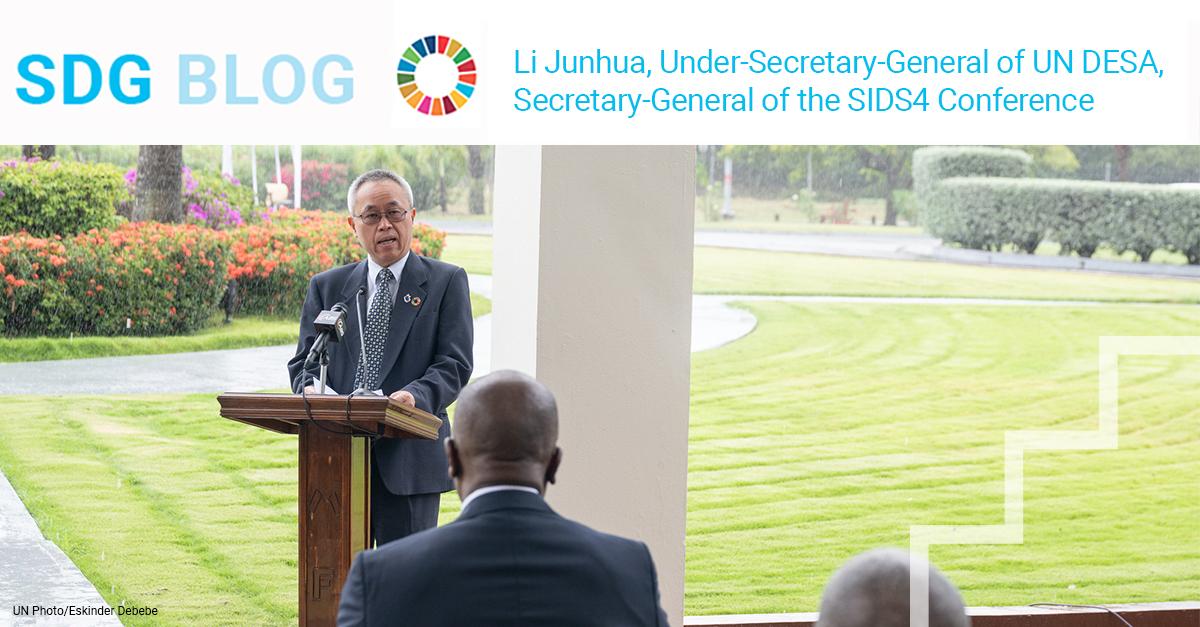SDG Blog

Stepping Up for Small Island Developing States: Time to Implement the Antigua and Barbuda Agenda
By Li Junhua, UN Under-Secretary-General for Economic and Social Affairs; Secretary-General of the SIDS4 Conference
As the curtains close on the 4th International Conference on Small Island Developing States (SIDS4) it is time to hope for a brighter future for SIDS.
This gathering - hosted with warmth and grace by the government and people of Antigua and Barbuda - was attended by over 3,000 participants from around the globe, including heads of state and government, ministers, and representatives from various sectors, showcasing an unwavering commitment to the people of small island developing States.
The adoption of “The Antigua and Barbuda Agenda for SIDS”, or “ABAS" for short, marks a pivotal moment in the journey towards sustainable development for these vulnerable nations. It makes clear the focus areas that must be prioritized over the next 10 years to make headway on SIDS development journey, outlining actions for both national and international actors.
But, as the Secretary-General emphasized at the opening of the Conference, now is when the real work begins. The solution lies not in crafting agendas but in translating them into tangible actions that make a meaningful difference in the lives of people on the ground.
This is not the first time that we have committed to meet SIDS where they are in delivering our support to their development needs. Since 1992, the international community has acknowledged SIDS unique vulnerabilities, and successive SIDS Conferences in Barbados, Mauritius and Samoa have delivered declarations of international support. But our delivery, as an international community, has not matched up with the reality of SIDS’ needs.
Our next steps cannot be "business as usual". The ongoing crises and escalating climate emergency add even greater urgency.
We must step up to stand alongside SIDS in support of their efforts to meet their unique challenges.
To me – as head of UN DESA, and in my role as Secretary-General of the SIDS4 Conference – this means five things:
- Firstly, the unique vulnerabilities of SIDS must be acknowledged and integrated into development assistance frameworks. The growing endorsement of the Multidimensional Vulnerability Index signifies a step towards quantifying and addressing these vulnerabilities. It's a call for international financial institutions to align their support with the needs identified by SIDS.
- Secondly, the pressing issue of the debt crisis cannot be ignored. Urgent action is needed to alleviate the burden of unsustainable debt, allowing governments the fiscal space to invest in their own sustainable development. SIDS need access to fairer borrowing terms.
- Thirdly, efforts to implement the ABAS must be accompanied by a scaling-up of climate action and finance. The existential threat posed by climate change is disproportionately borne by SIDS who are among the least contributors to global warming.
- Fourthly, the leadership and innovation demonstrated by SIDS themselves cannot be overlooked. The implementation of the ABAS must be driven by SIDS-led solutions, leveraging initiatives like the Centre of Excellence for SIDS and the Debt Sustainability Support Service.
- The international community must show, with action, true solidarity with SIDS. Fifteen heads of UN entities participated at the SIDS4 Conference, each committed to advancing the ABAS. UN DESA will spearhead the UN process to develop a monitoring and evaluation framework for the ABAS to help measure progress and guide implementation. We will be there with SIDS every step of the way.
The conference in Antigua and Barbuda served as a beacon of hope and determination. It is a testament to what we can do when nations come together with a shared purpose. We will take this spirit into the Summit of the Future in September in New York and its focus on a renewed multilateral system.
As delegates said farewell to Antigua and Barbuda, I believe they carried with them not just memories of a successful conference. They also carried with them important connections to be built upon, innovative solutions to be explored, and a renewed sense of purpose to turn promises into action.
 Welcome to the United Nations
Welcome to the United Nations